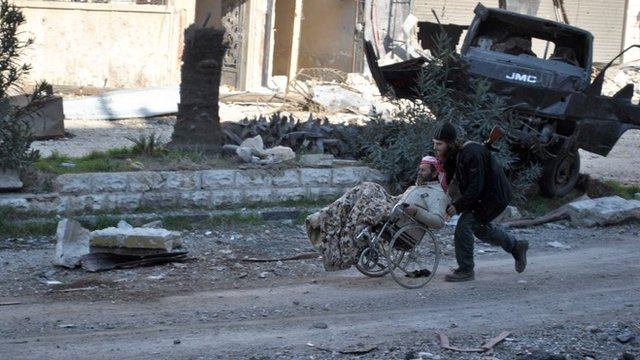Hopes for Homs truce as Geneva talks held
A fresh humanitarian truce is being negotiated in the Syrian city of Homs after hundreds of people were evacuated at the weekend, reports say.
The move comes as the second round of peace talks between the Syrian government and the opposition began in Geneva.
The first round of talks ended last month with no firm agreements and with both sides trading insults.
The civil conflict has claimed more than 100,000 lives since 2011.
The violence has also driven 9.5 million people from their homes, creating a major humanitarian crisis within Syria and for its neighbours.
The evacuations in Homs were completed after a first three-day truce which ended on Sunday.
They took place amid mortar fire and shooting, which both sides blamed on each other. Activists say several people were killed.
Both the governor of Homs and opposition sources have spoken of a three-day extension to the ceasefire.
On Monday, French Foreign Minister Laurent Fabius said France and other countries would present a resolution at the UN calling for greater access for humanitarian aid.
“We are asking for stronger action as far as the humanitarian side is concerned, that medicines and food supplies are handed out in cities,” he told French radio.
“It is absolutely scandalous that there have been discussions for quite a while and that people are still being starved every day, and so along with a number of other countries, we will present a resolution at the UN along those lines.”
The Syrian government has acknowledged that some of those evacuated from Homs on Sunday were detained after they left the city.
A Syrian information ministry spokesman has told the BBC that 103 “militants” had been detained for security checks, but had since been released.
 A truce allowing more than 600 people to be evacuated on Sunday has reportedly been extended
A truce allowing more than 600 people to be evacuated on Sunday has reportedly been extended Civilians, including a man with crutches, walk towards a meeting point to be evacuated
Civilians, including a man with crutches, walk towards a meeting point to be evacuated Civilians gather before being evacuated at crossing points
Civilians gather before being evacuated at crossing points Efforts are also being made to provide more relief supplies to those still trapped in the city
Efforts are also being made to provide more relief supplies to those still trapped in the cityBut other reports suggest the men have not been released, and are still being detained with their families.
In other developments on the ground in Syria:
- Rebel fighters from the hardline Islamist brigade, Jund al-Aqsa, have killed at least 21 civilians and 20 pro-government militiamen in Maan, a predominantly Alawite village in Hama province, the UK-based Syrian Observatory for Human Rights (SOHR) said. A video posted online purportedly showed members of Jund al-Aqsa moving into the village and opening fire
- The jihadist Islamic State in Iraq and the Levant (ISIS) is reported to have withdrawn from the eastern province of Deir al-Zour, after days of heavy fighting with rival rebel groups, including the al-Qaeda-affiliated al-Nusra Front. Pro-ISIS activists said it wanted to prevent further bloodshed
After the ceasefire in Homs expired on Sunday evening, explosions and gunfire rang out all night before calm returned early on Monday, reports say.
The situation was discussed in Geneva, but the humanitarian aid deal was actually struck between the governor of Homs and the UN resident co-ordinator in Syria.
As well as evacuating hundreds of people over the weekend, UN and Syrian Red Crescent teams managed to deliver relief supplies to the Old Quarter of Homs, which has been besieged by government forces for more than a year.
The city has been a key battleground in the uprising against President Bashar al-Assad.
The army launched a series of major attacks to recapture rebel areas in the Old Quarter in the beginning of 2012, with almost daily bombardments.
Figures released by the SOHR show that rebel in-fighting, clashes with President Assad’s forces and government bombardments have escalated across Syria since the peace talks delegates held their first face-to-face meeting.
Political will
There was little sign of progress on Monday morning, says the BBC’s Bridget Kendall in Geneva.
The two sides are not even meeting face to face. UN envoy Lakhdar Brahimi has decided to keep them apart for now as he tries to set the agenda, our correspondent reports.
He has apparently asked both sides to declare they have the political will to abide by an agenda that includes both stopping violence in Syria and setting up a transitional governing body.
The Syrian government wants to focus on what it terms “terrorism” by rebel forces, while the opposition wants to discuss transferring power to a new government.
The opposition said on Monday morning that it was totally unacceptable for the government to talk peace while continuing to drop lethal barrel bombs on the northern city of Aleppo.
At the end of the last peace talks on 31 January, the two warring sides appeared to be a long way from reaching any compromise – though Mr Brahimi said then that some “common ground” had been reached.
The opposition wants the government to commit in writing to the 2012 Geneva Communique, which called for the formation of a transitional administration with full executive authority.
President Assad’s government has emphatically ruled out any transfer of power.
Correspondents say his position has been strengthened on the ground since the last round of talks because pro-Assad forces have made territorial gains while rival rebel forces have been fighting each other in the north and east of the country.

BBC



